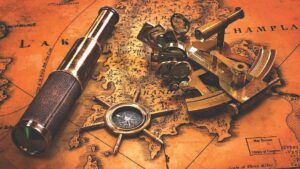
In the fall of 1987, I almost washed out of the Navy’s Officer Candidate School. This is a polite way of saying I nearly flunked out. The crux of the matter was that I had a difficult time comprehending what I considered to be the dark art of celestial navigation.
Passing the course required a basic understanding of how to use a sextant–a beautifully constructed instrument designed to measure the angle of an astronomical object from the horizon. With some basic trigonometry, a knowledge of the time, and an assist from nautical tables, sailors can then use this information to discern their location anywhere on the ocean. Fortunately, with the help of smart classmates and a sympathetic instructor, I scraped by with the equivalent of a C-minus.
In the late 1990s, a few years after I had resigned my commission, the Navy discontinued the course on the grounds that in an era of ubiquitous satellites capable of quickly providing sailors with their precise location anywhere in the world, it no longer made sense to spend valuable time instructing future officers in the skill.
Two decades later, in 2015, the Navy reinstated the course because it had come to appreciate that in the next hot war our opponents might very well render satellites useless and, if successful, the United States would have a generation of officers lost at sea.
I mention this because it now seems a great many people are metaphorically lost at sea. There are a myriad of reasons for this but I’d like to advance the case that a primary one is that many Western educational institutions have removed classical skills which once served as the spiritual equivalent of the sextant.
The most basic is contemplation. Few institutions offer much in the way of helping students think in silence. Herbert Simon once said, “A wealth of information leads to a poverty of attention.” He was right. Contemplation, in combination with silence, offers an excellent starting place for differentiating true signals from today’s stormy sea of noise.
Another lost art is captured in the wonderful Latin phrase “solvitur ambulando” which translates to “it is solved by walking.” Walking frees the mind and heightens our senses of observation. Both are essential for effective problem-solving in today’s hyper-complex world.
The Christian practice of memento mori–Latin for “remember you must die–is yet another lost skill worthy of resuscitation. Far from being a morbid topic, contemplating one’s mortality can be indispensable in providing people clarity by helping them find their sacred task in life.
There are countless other lost arts but I will end with the importance of simply sitting under the night skies. At a practical level, the vast grandeur of the cosmos reminds us of how little we still know and this serves to keep us curious and humble. At a deeper level, the stunning majesty of the heavens can prompt us to consider the possibility that there may just be a greater force at work in our Universe and, if we can once again learn to discern this transcendent presence, we may be able to find our place in the world again.
Jack Uldrich is a global futurist, best-selling author and keynote speaker. He is also an adjunct professor at the College of Saint Benedict and Saint John’s University in Collegeville, MN. One of his more popular books on the topic of leadership was “Soldier, Statesman and Peacemaker: Leadership Lessons of General George C. Marshall.”
